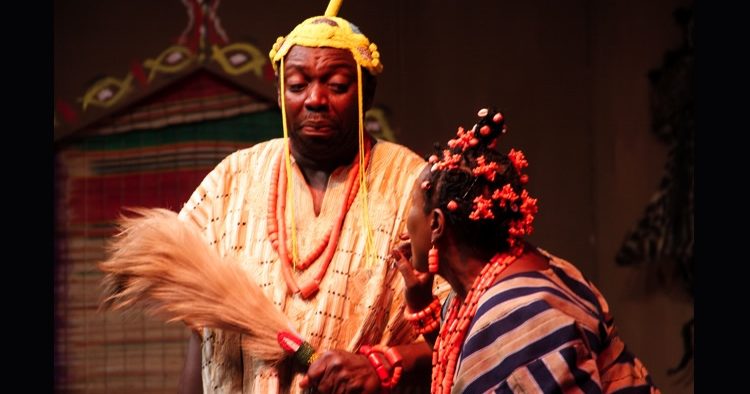An Afternoon With The Mad King Of Ijudiya
Share

 It was an interesting and eclectic performance put up by the cast of ‘Mad King of Ijudiya’, a play written and produced by Ayo Jaiyesimi, sponsored by FirstBank Plc.
It was an interesting and eclectic performance put up by the cast of ‘Mad King of Ijudiya’, a play written and produced by Ayo Jaiyesimi, sponsored by FirstBank Plc.
Mad King of Ijudiya tells the story of King Ero ba ni se, a draconian ruler, who, for fear of rivalry with a newborn baby the gods predict will be stronger than him, becomes outrageous and seeks to eliminate the newborn baby.
The play opens with a king who is not as powerful as King Ero ba ni se giving his daughter’s hand in marriage to Eliase. The marriage ceremony is disrupted by the sudden invasion of King Ero ba ni se’s warriors led by the fearless warlord, Iberu. Iberu and his men are in the little village to demand for taxes. The king is adamant and refuses to subject himself to the threats of Iberu and the unlawful taxation of his people by King Ero ba ni se. Before long, the king, his subjects and entire household are taken captive by Iberu and they become slaves to King Ero ba ni se.
The next scene takes the audience into the dreary household of King Ero Ba ni se where the figure of his mother, the Queen, looms large. She questions the four wives of the king on the meals they have prepared for her son who she she proudly refers to as “the only star in the galaxies”. She aptly condemns the numerous delicacies the wives have prepared for her son. The gbegiri (bean soup) of the most senior wife has gone sour and thus is not suitable for the king. The efo riro (vegetable soup) of the senior wife does not contain dried fish, hence her son does not deserve such an unworthy meal. The ila asepo (mixed okro soup) of the junior wife contains ponmo (cow skin), and so, how can the only star in the galaxies be served cow skin?
A twist is brought into the plot when the most junior wife, Epo Oyinbo, tells the Queen Mother pointblank: “I did not cook any meal for our husband, Maami. Why should I stress myself making a meal for the king? I have to reserve my energy and take care of my delicate skin to satisfy the king.”
The theme of pride runs through the entire play. King Ero ba ni se and his mother are shrouded in pride. The Queen Mother is full of praise of his son just as the king praise-sings himself before he sits on his throne. Pride is so ingrained in the Queen Mother’s consciousness that cow skin becomes an unsuitable meal for the great King of Ijudiya.
Another thematic preoccupation of the play is tyranny, a theme that is common in most African plays. Like Femi Osofisan’s Album of the Midnight Blackout, Mad King of Ijudiya is comical and reiterates an enduring propensity for social and political commitment. It reflects and refracts the socio-political events in the Nigerian society. It celebrates Nigeria’s rich cultural heritage through its folklores and songs, a testament to the fact that the biblical story of Jesus’ birth can be adapted to suit any clime.
Through its thematic preoccupation, the play celebrates the heroic grandeur of the Nigerian struggle against tyranny. One could say it highlights the nation’s anti-colonial struggle and the postcolonial disillusionment that has plagued the Nigerian people since 1960.
Jaiyesimi’s play also reveals that in Nigeria, the seeds of disharmony, mediocrity and macabre corporate distrust have been sown; corruption and rampant scarcity of personal integrity have replaced the hitherto peaceful existence. The play shows how the traditional map of African play has been altered beyond recognition because of its undisguised depiction of postcolonial decadence. It is about existential and societal realities of the neo-colonial Nigerian nation, even though the play has a village setting.
To this end, Mad King of Ijudiya, like many other comical African plays, reveals an atmosphere of fear, hate, humiliation and an aura of repression, in forms of arrest, slavery and execution. It highlights the dictatorial and oppressive tendencies of the imperialist and comprador bourgeoisie in neo-colonial African nations. It’s a good play to see with its brilliant costumes, stage setting, lighting, well choreographed dance and songs.





